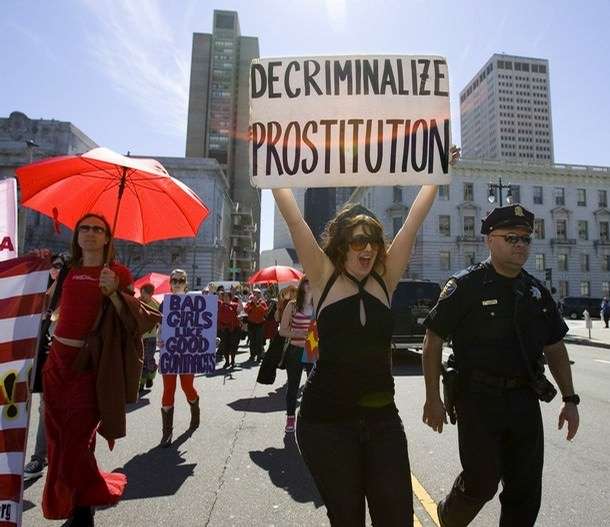Challenge to California Prostitution Law Banned by Crowdfunding Site GoFundMe
The situation is common for projects even tangentially connected to sex work or adult entertainment. Guess who's to blame?


On March 4, the nonprofit Erotic Service Providers Legal, Education, and Research Project (ESPLER) filed a federal lawsuit seeking to challenge California's prostitution laws on multiple constitutional grounds. ESPLER was planning to partially fund the case with donations gathered on the crowdfunding platform GoFundMe. But apparently this runs afoul of the site's terms and conditions, which ban campaigns concerning "sexually explicit material" and "material relating to adult industry."
The situation illustrates a common problem for any project even tangentially connected to sex work or adult entertainment. Last May, an effort by porn performer and director Eden Alexander to crowdfund medical bills was pulled from fundraising site Giveforward because its payment processor, WePay, prohibits campaigns that have a "connection with pornographic items," though the companies eventually allowed Alexander's campaign to continue. PayPal also refuses to process payments related to "adult content." In March 2014, PayPal threatened to end its relationship with crowdfunding site Pantheon Patreon if the site didn't hide projects such as Kitty Stryker's crowdfunding her writing and speaking about porn and privacy issues. It canceled porn performer Maggie Mayhem's account when she tried to raise money to travel to Haiti and help with relief work. And these are just a few of many examples floating around the Internet.
Porn performers have also run into trouble using Chase and other banks. In these and the crowdfunding site cases, explanations are vague, if given at all. Obviously private companies like PayPal and Chase have a right to set restrictions on whom they do business with and how services can be used. But perhaps more would embrace "adult" projects—or at least stop rejecting those with even a whiff of ties to adult industries—if it weren't for pressure from the government.
This pressure is exerted in myriad ways. There's the Department of Justice's "Operation Chokepoint," which coerces banks and other payment processors into rejecting accounts related to "risky" industries, such as ammunition sales, online gambling, and adult entertainment. There are state laws that criminalize any activity that "causes or aids" or facilitates prostitution, and they can be used liberally. There are ongoing attempts, by state and federal lawmakers, to hold websites criminally liable for content posted to them by users. And the FBI successfully used anti-racketeering law against a website for giving sex workers a place to speak and advertise. With the call to combat sex-trafficking reaching a fever pitch recently (and many officials refusing to distinguish between consensual and forced prostitution), this pressure is only poised to grow.
GoFundMe didn't initially object to ESPLER using the site for fundraising. Last year, the group crowdfunded $30,000 on the platform. But after setting up a new campaign last week, ESPLER was informed that GoFundMe was canceling both this campaign and the organization's account entirely, due to unspecified violations of site policy. The only explanation ESPLER President Maxine Doogan could get from GoFundMe are that the site's terms and conditions had changed.
Kelsea, one of GoFundMe's "customer happiness" associates, told me that she's not able to discuss the details of funding campaigns with anyone other than campaign organizers. But she did point me to a September 2014 post highlighting GoFundMe's newly updated policies. "In many cases, campaigns relating to, but not directly funding any of the prohibited activities listed below, will remain permissible," the site says, leaving room for some cases not directly funding these activities to be banned still. At the top of its prohibited content categories are "sexually explicit material, sexually suggestive material, adult services or products, pornography of any kind, [and] material relating to adult industry."
ESPLERP is still going forward with the suit, and will soon be accepting donations at Tilt.com. [Update: Check out ESPLER's new crowdfunding campaign here.] "We apologize for the inconvenience and look forward to serving you in expanding sexual privacy for ALL," the organizaiton posted on March 6.
Filed in the U.S. District Court for Northern District of California, the suit finds fault with Section 647(b) of the California Penal Code, which makes it a misdemeanor disorderly conduct charge to solicit, engage in, or agree to engage in any act of prostitution. Passed in 1961, the law states:
A person agrees to engage in an act of prostitution when, with specific intent to so engage, he or she manifests an acceptance of an offer or solicitation to so engage, regardless of whether the offer or solicitation was made by a person who also possessed the specific intent to engage in prostitution. No agreement to engage in an act of prostitution shall constitute a violation of this subdivision unless some act, in addition to the agreement, is done within this state in furtherance of the commission of an act of prostitution by the person agreeing to engage in that act. As used in this subdivision, 'prostitution' includes any lewd act between persons for money or other consideration."
"There is no compelling or legitimate governmental interest" in criminalizing these activities, the suit alleges. Of the case's four plaintiffs, three are sex workers and one is an individual who wishes "to represent the right to compensate for intimate private contact." Their main claims are that California's prostitution law deprives individuals of the right to engage in private, consensual sexual activity—"a fundamental liberty interest protected by the Fourteenth Amendment" and "upheld by various courts throughout the United States" (most notably in Lawrence v. Texas)—along with their rights to choose how to make a living, decide whom to enter into contract with, freedom of speech, and freedom of association.
Editor's Note: As of February 29, 2024, commenting privileges on reason.com posts are limited to Reason Plus subscribers. Past commenters are grandfathered in for a temporary period. Subscribe here to preserve your ability to comment. Your Reason Plus subscription also gives you an ad-free version of reason.com, along with full access to the digital edition and archives of Reason magazine. We request that comments be civil and on-topic. We do not moderate or assume any responsibility for comments, which are owned by the readers who post them. Comments do not represent the views of reason.com or Reason Foundation. We reserve the right to delete any comment and ban commenters for any reason at any time. Comments may only be edited within 5 minutes of posting. Report abuses.
Please to post comments


GoFuYourself
"As used in this subdivision, 'prostitution' includes any lewd act between persons for money or other consideration."
How does this not apply to virtually EVERY sexual and/or romantic relationship?
That's exactly what I was thinking when I read it. "Or other consideration" is the epitome of vague.
Well, the story layout does look like this:
Guess who's to blame?
Elizabeth Nolan Brown
Also, define 'lewd act.'
There are some that would say my very presence is a lewd act. Plus, I'm pretty sure stripping is a lewd act between persons for money, but no one would consider stripping to be prostitution.
Yer very presence is a lewd act, Irish! Now slip me some whiskey (or campaign contributions), and my objections might very well just go away...
Paying a stripper to watch her strip?!?! Jessum, would ya pay a dining establishment to smell the food, fer Chrissakes?!?!?! What gives?!?!
Isn't that the point? To make laws so vague they can be selectively enforced against anyone who isn't connected and powerful?
...using government to force abstinence from even appearance of things that are dirty, unclean, or uncomfortable.
Society must be purified and, unfortunately, the hypersensitive whims of the social-planning tyrants are happily plied by the dutiful and corporate.
Modern men and women anywhere near the power hubs generally trend spineless and craven.
engage in private, consensual sexual activity?"a fundamental liberty interest protected by the Fourteenth Amendment" and "upheld by various courts throughout the United States" (most notably in Lawrence v. Texas)?along with their rights to choose how to make a living, decide whom to enter into contract with
So this will be the bastard offspring of Lawrence and Lochner. Waiting for proggie heads to explode.
So this will be the bastard offspring of Lawrence and Lochner.
That's kind of my favorite part. Though ESPLER has mostly been emphasizing the Lawrence precedent, and not earlier contract-related stuff.
Yeah I wouldn't put much money on this winning. The police power as exercised by California is well within historical norms. The real answer is to change the law via legislation not litigation - even winning this case would be another instance of good result via poor legal reasoning.
Who ruined the comments format?
Of course, the true evil here is the federal government's Operation Chokepoint. Surely an extra-legal and unconstitutional exertion of government power to prevent people who are guilty of no crime engaging in activities that are perfectly legal everywhere in the united states.
If there was a single true liberal anywhere in public life, this would be a clarion call to action against their dear leader in the White House. But instead you'd be hard pressed to find anyone outside of our nutty community who has the slightest idea that it exists.
I'm pretty sure when GoFundMe adopted that "relating to adult industry" (probably boilerplate), they didn't have this in mind, but somebody there later interpreted it that way. It's confusing writing about porn with porn itself.
It's Patreon btw, not Pantheon
thank you!
One of the rationale for Chokepoint (other than looking scams) and one of the reasons most businesses are very scared about doing anything sex-related are the strict regulations involved. These are criminal penalties, not civil regulations or fines. It puts a liability on anyone who knowingly gets involved in third party activity including speech, that doesn't strictly comply with myriad of federal and state laws. And some of the sex-crime laws are completely subjective like speech that is harmful-to-minors and obscenity laws.